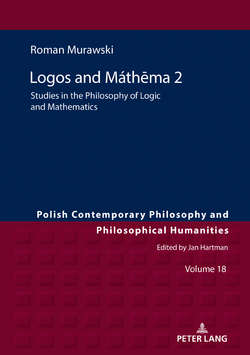Читать книгу Lógos and Máthma 2 - Roman Murawski - Страница 12
На сайте Литреса книга снята с продажи.
Incompleteness results
ОглавлениеHilbert and his school had scored some successes in realization of the program of justification of infinite mathematics. In particular, Hilbert’s student W. Ackermann showed by finitistic methods the consistency of a fragment of arithmetic of natural numbers (cf. Ackermann 1924–1925, 1940). But soon, something was to happen that undermined Hilbert’s program.
We mean here the incompleteness results of Gödel from 1930 which indicated certain cognitive limitations of the deductive methods (cf. Gödel 1931). They showed that one cannot include the whole mathematics in a consistent formalized system based on the first order predicate calculus – what more, one cannot even include in such a system all truth about natural numbers. Even more, no formal theory containing arithmetic of natural numbers can prove its own consistency.
Gödel’s results struck Hilbert’s program. The question whether they rejected it cannot be answered definitely. The reason is that Hilbert’s program was not formulated precisely enough. Hence, various opinions are formulated and defended (cf., e.g. Detlefsen 1979, 1990; Resnik 1974; Smorynski 1977, 1985, 1988). But one thing ←13 | 14→should be stressed here: the failure of Hilbert’s programme for a certain formalized system of arithmetic need not be a failure of Hilbert’s programme for elementary number theory in the informal sense. In fact, one cannot exclude the possibility that the latter can be formalized in a system which can be justified on finitistic grounds.5
Gödel’s true but undecidable (in the formal system of arithmetic) sentence had not mathematical but in fact metamathematical contents (it states: “I am not a theorem”). This diminished the meaning and significance of Gödel’s results. There arose a question: Is it possible to indicate examples of true undecidable sentences of mathematical, in particular number–theoretical, contents? Or formal mathematics is complete with respect to sentences which are interesting and reasonable from the mathematical point of view (whatever it means)?
These questions were answered by J. Paris, L. Harrington and L. Kirby who gave examples of true undecidable sentences of combinatorial contents (cf. Paris and Harrington 1977) and of number–theoretical contents (cf. Kirby, Paris 1982). They are examples of true arithmetical sentences without “pure”, i.e., arithmetical proofs. More exactly, we got sentences talking about some combinatorial properties of finite sets or properties of sequences of natural numbers but natural proofs of them use infinite sets and, since they cannot be proved in Peanoarithmetic PA, each such proof must contain something from beyond the domain of finite objects. Thus they are theorems having “impure” but no “pure” proofs.
Add that those results were used by quasi-empiricists in mathematics who argue that mathematics is not an a priori knowledge, it is not absolute and certain, but is rather quasi-empirical, probable and fallible; mathematics is in fact similar to natural sciences. The new undecidable results indicate also that, as E. Post put it, “mathematical proof is in fact a result of creative activity of reason”, it is impossible to bound a priori the invention of a mathematician.
←14 | 15→
